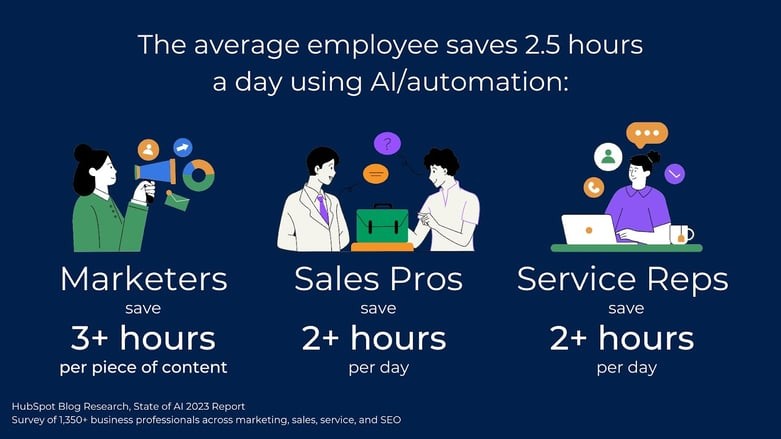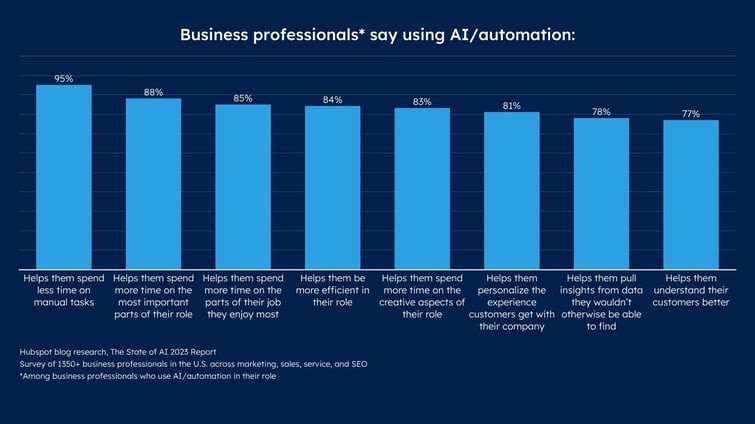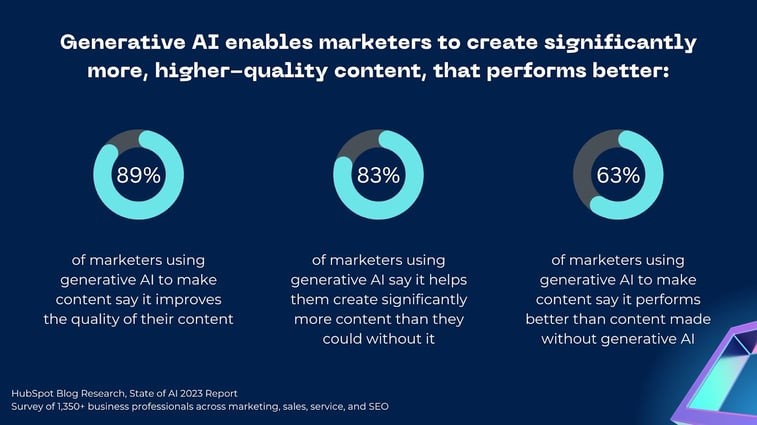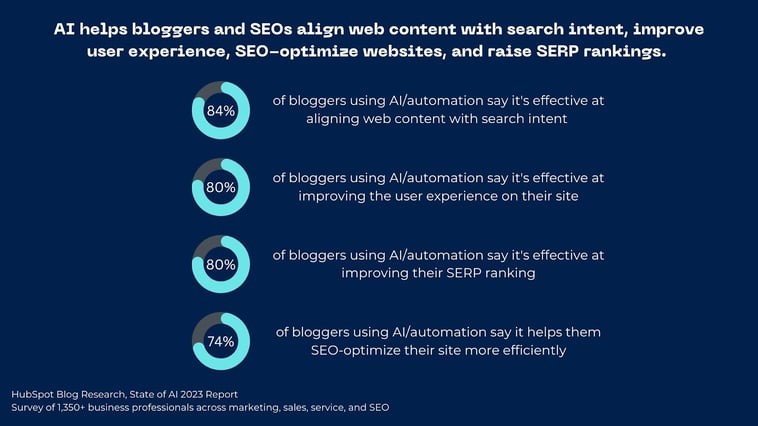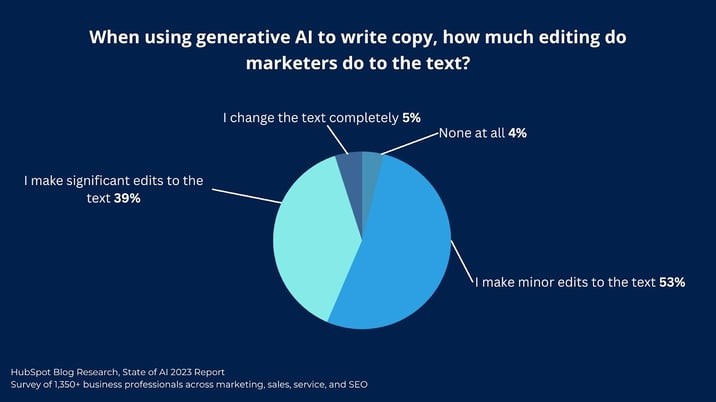Whether you’re already using AI in your role or still on the fence, there’s no denying that the way we work is about to change drastically.
Just like computers revolutionized the workplace in the late 1900s, AI’s ushering in a new era that not only makes us more productive, but maybe even happier.
AI isn’t here to take over our jobs, but by saving the average professional a whopping 2.5 hours a day, AI helps us spend more time on the most impactful, creative, and enjoyable parts of our roles.
We surveyed 1,350 professionals across business departments to learn more about attitudes towards AI, how it’s already used, and the impact it will have in the future.
Key AI Survey Findings
1. AI unlocks growth — even in a tough economic climate.
AI became accessible to the masses just as businesses started to struggle to keep up with inflation and budgetary pressures.
By boosting employee productivity and effectiveness, AI allows companies to do more with less.
Marketers using generative AI save an average of at least three hours on each piece of content they make.
Across the wider business, sales professionals save two hours and 15 minutes a day using AI to automate manual tasks, while service professionals save more than 2 hours a day using generative AI for rocket responses.
This makes business leaders highly optimistic about AI, with 68% saying it can help their company scale in a way that would be impossible without it.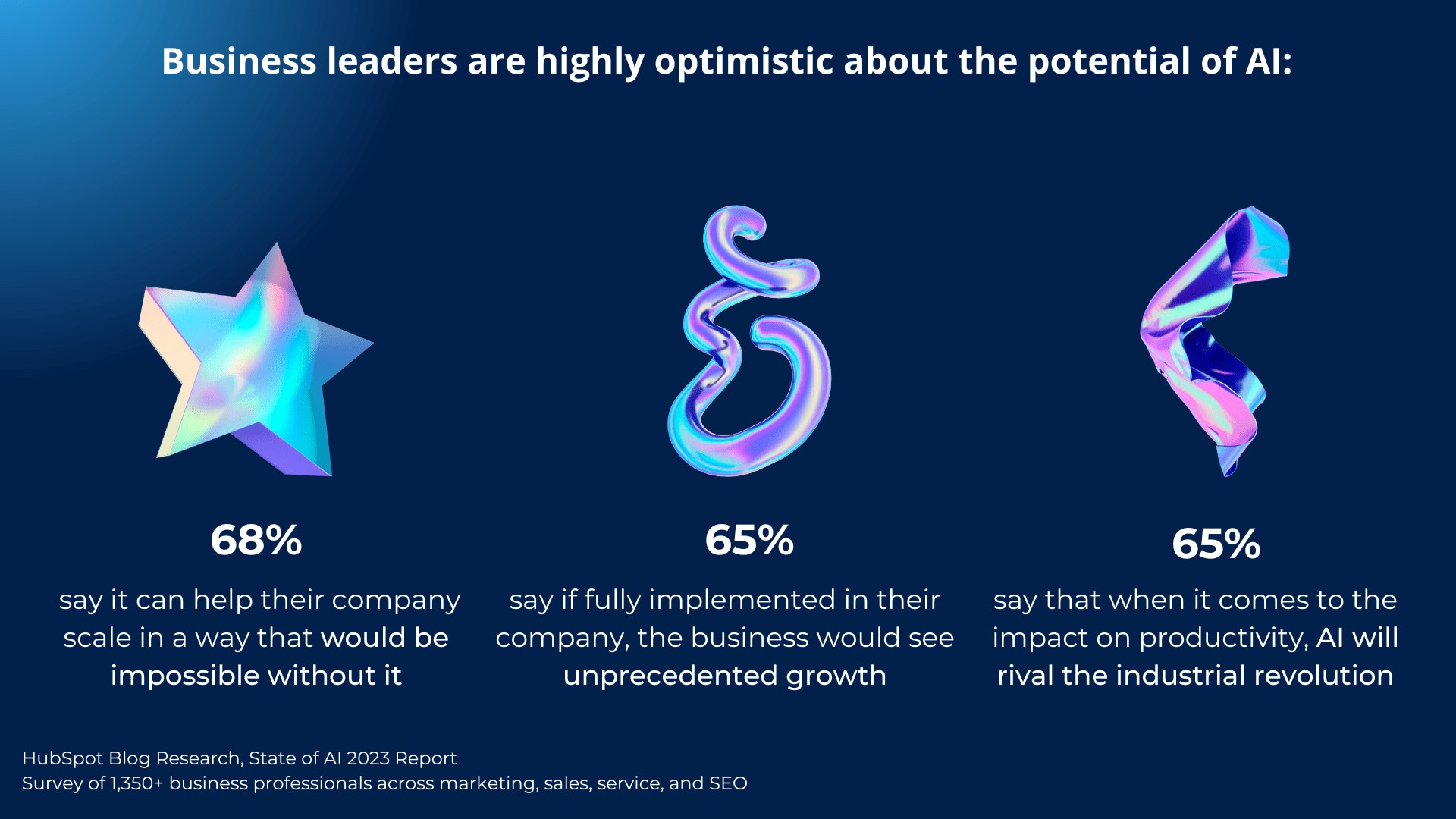
65% think if it was fully implemented, their business would see unprecedented growth, and another 65% see AI having a similar impact on productivity as the industrial revolution had.
About 62% of leaders have already invested in AI for their employees to use. 71% of them report a positive ROI and 72% say it makes their workers more productive.
![The HubSpot Blog’s State of AI Report [New Data]-May-15-2023-03-14-33-0703-PM](https://sitetips.info/wp-content/uploads/2023/05/a9ad3930bff34ca02646040a287615d2-1.jpg)
2. AI enables more time for the most impactful work.
95% of professionals using AI say it helps them spend less time on manual tasks, spend more time on the most important parts of their role (88%), the parts of their job they enjoy most (85%), and on the creative aspects of their role (83%).
Our marketing trends 2023 survey shows that marketers spend an average of five hours a day on manual, administrative, or operational tasks.
AI allows us to stop doing those tedious tasks and spend more time on high-impact activities we actually enjoy.
3. AI is highly effective across industries.
It’s not just about saving time -- business professionals using AI are more effective at their jobs.
For marketers, generative AI enables them to create significantly more content, and that content performs better.
63% of marketers using generative AI to make content say it performs better than content made without generative AI.
Meanwhile, 89% say it improves the quality of their content and 83% say it helps them create significantly more content than they could without it.
When it comes to marketing content specifically, AI can also streamline processes.
A whopping 84% of bloggers using AI and/or automation say it's effective at aligning web content with search intent. Additionally, 80% say it can help improve user experience, 74% believe it benefits their SERP ranking, and 80% say it can help boost SEO.
Outside of marketing, 85% of salespeople using AI say it makes their prospecting efforts more effective, allows them to spend more time selling (79%), and helps build rapport faster (72%).
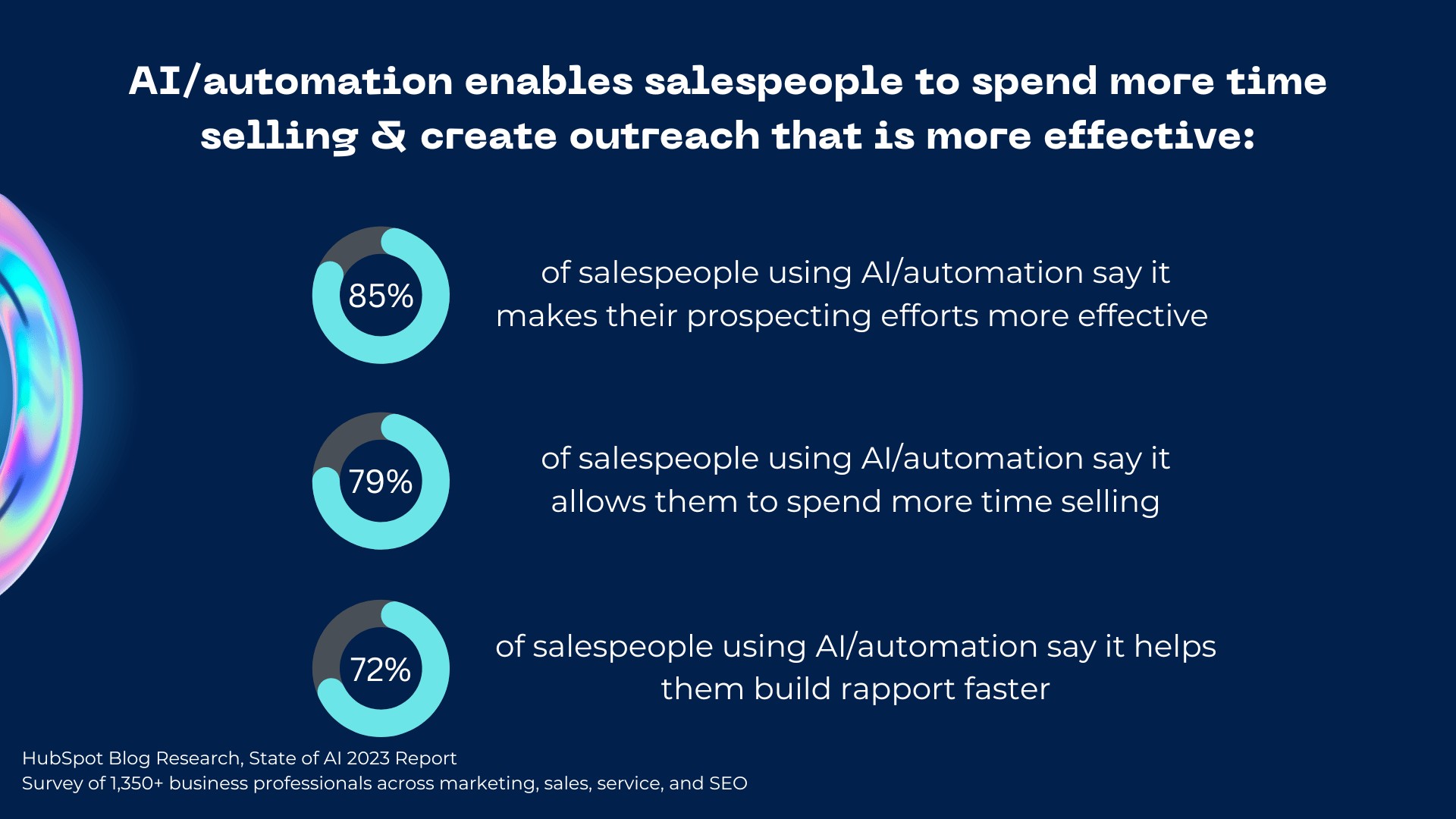
Lastly, 84% of customer service reps who use AI say it makes it easier for them to respond to tickets, and 64% say generative AI makes their correspondences more personalized.
4. AI isn’t taking over jobs.
41% of professionals in our survey are concerned about AI taking over their jobs.
But when we look at how people are actually using generative AI, it's mainly to get ideas, outlines, and first drafts.
And, if you’ve ever tried to get AI to write a publish-ready article or social post, you know it just isn’t quite good enough.
When using generative AI to write copy, just 5% of marketers use it to write entire pieces of content for them.
While one-third (35%) of generative AI users lean on it to get ideas or inspiration, another third use it to get an outline down. Meanwhile, just 25% use it to write a few paragraphs that they’ll then need to expand on.
Additionally, 96% of marketers using generative AI to write copy say the need to make some level of edits to the text before it’s publish-ready.
Still, people are cautious when it comes to generative AI, with 76% of professionals saying employees should use AI or automation at work — but avoid becoming overly reliant on it.
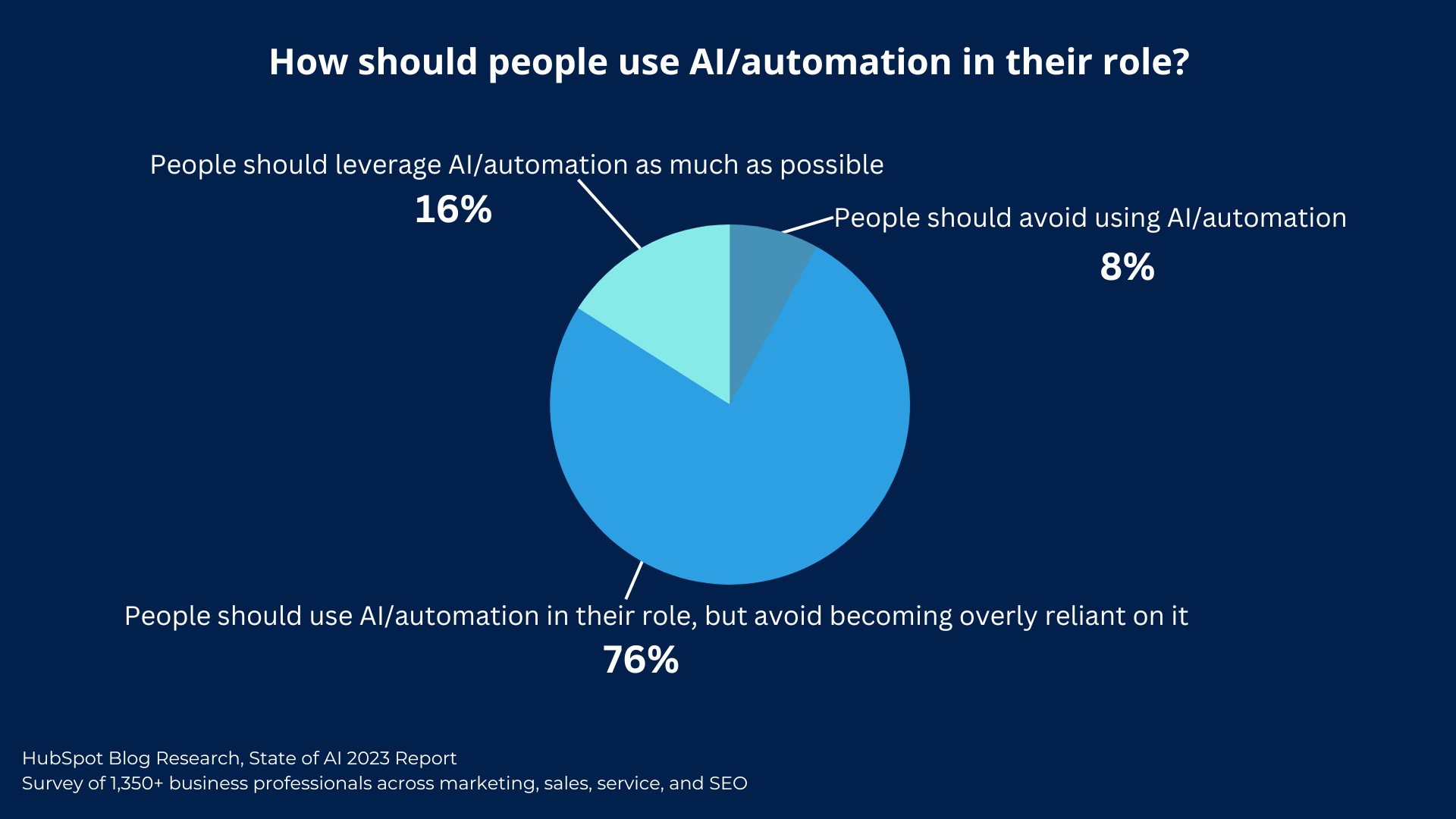
Aside from job fears, there’s another big reason not to lean on generative AI too much.
The biggest challenge marketers face with generative AI is that it sometimes provides incorrect information. Without doing deep research, there’s really no way to know when it’s making something up.
For example, almost half of marketers using generative AI say they’ve received information that they know is incorrect. To make matters worse, only 27% are very confident they’d know if the information was wrong.
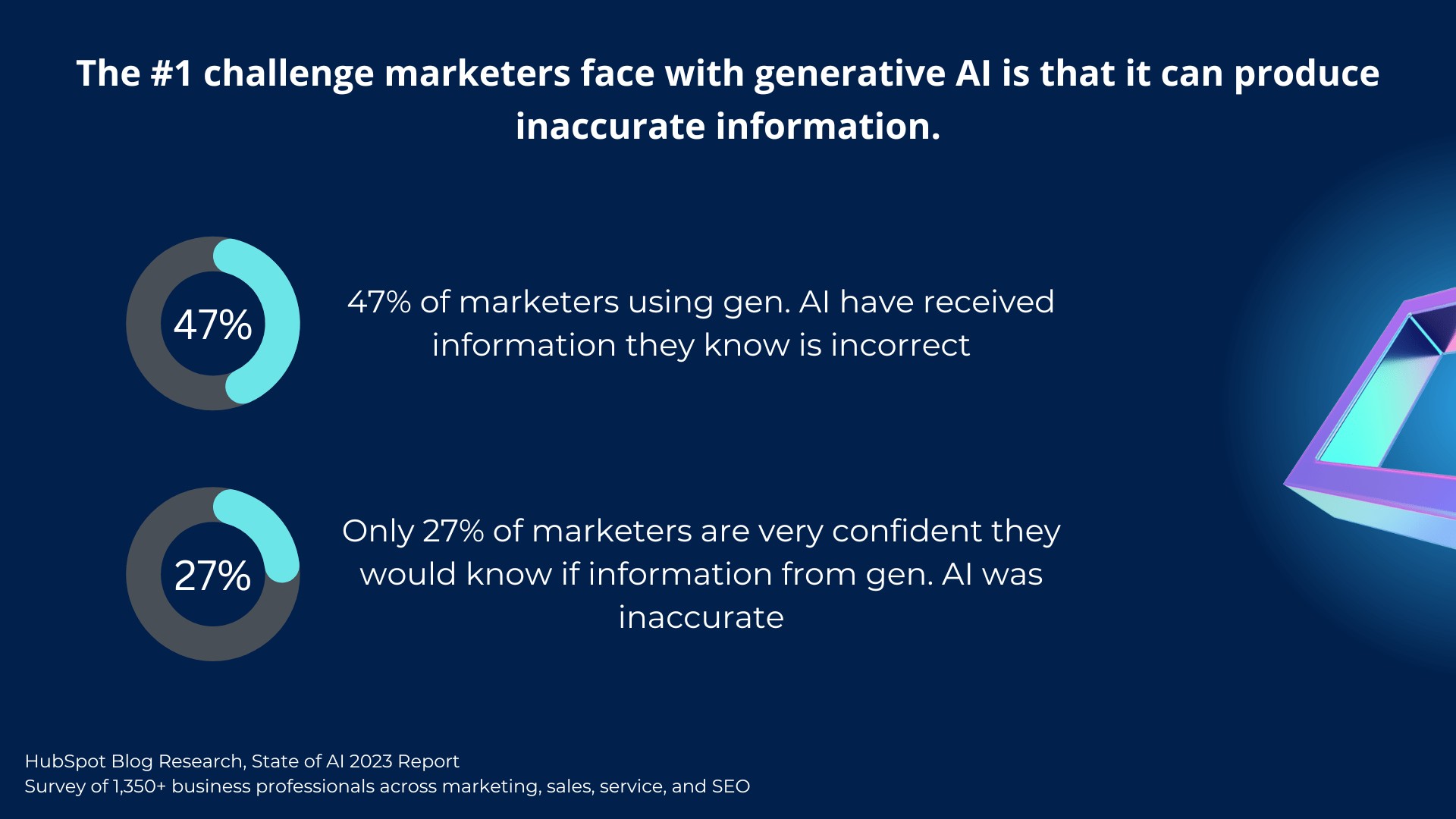
This highlights the importance of having a knowledgeable (human) expert working with AI to ensure information is accurate and guide it in the right direction.
Another major challenge with using AI is knowing where and when to use it. Which tasks should be automated and which require the human touch? Let’s get practical and take a look at specific use cases for AI across marketing, sales, service, and SEO.
How AI’s Used in the Workplace
Right now, one in five business professionals use AI and/or automation in their role. And, this percentage gets bigger when diving into certain fields — like marketing.

Since this is all so new, the question of what counts as AI or automation is still loosely defined, so actual usage is probably much higher. Let’s take a look at specific use cases for each role to get a better idea of how AI is being used at work.
AI in Marketing
Whether or not they use it, 82% of marketers say generative AI has impacted the way they plan to create content in 2023 and 69% say it is important to their overall content strategy.
The biggest benefits of generative AI are that it allows marketers to make content faster. It also increases the quality and personalization of their content, and offers inspiration.
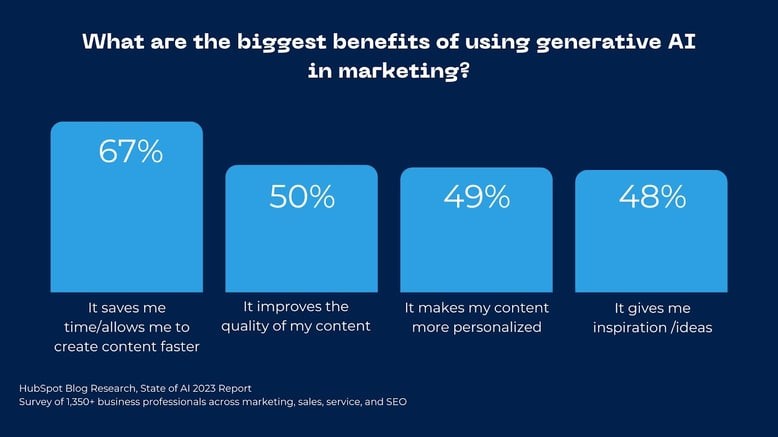
How Marketers Use Generative AI
The most popular use cases for generative AI among marketers are conducting research (48%), creating content (45%), analyzing and reporting on data (45%), and learning how to do things (32%).
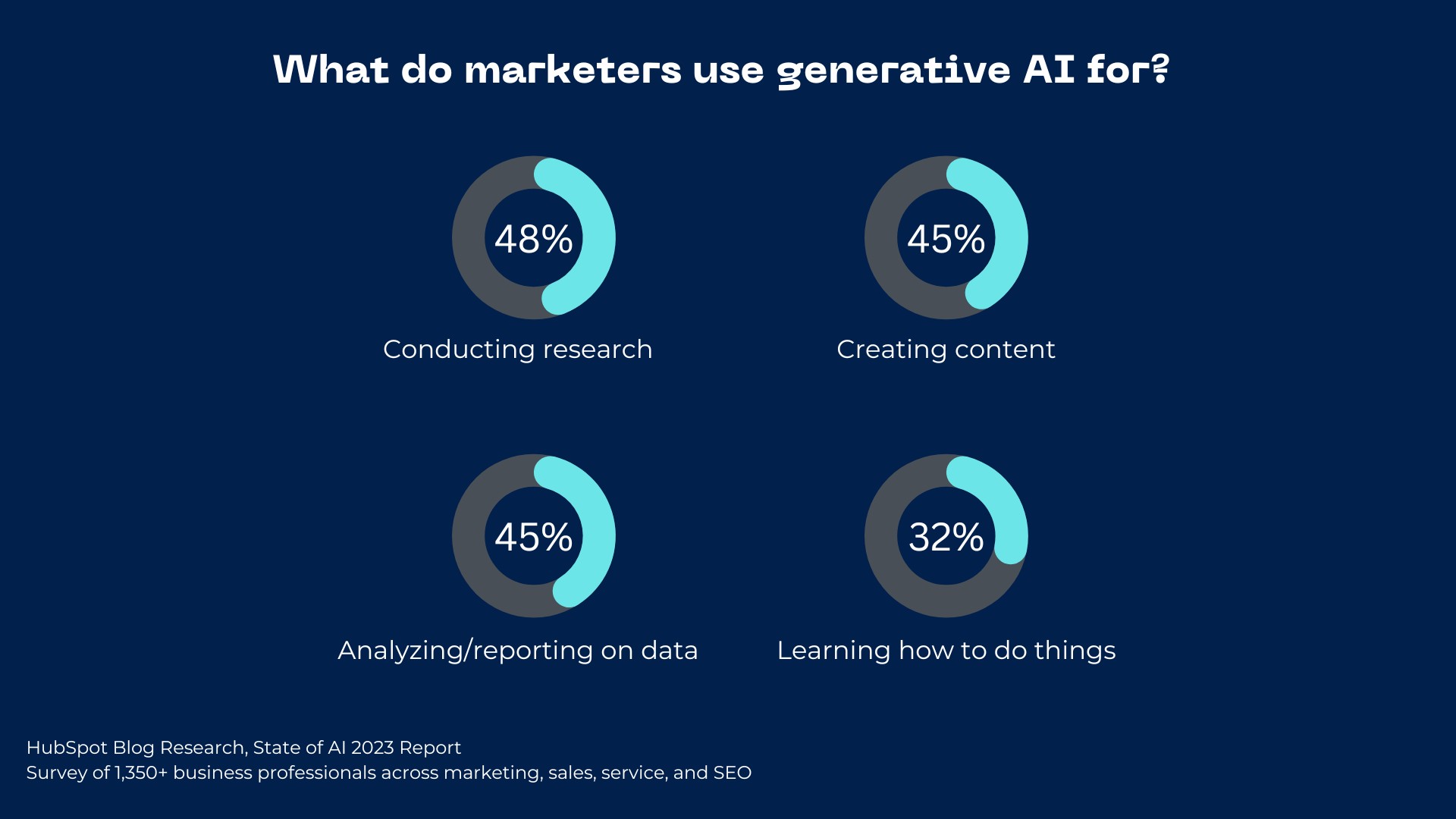
When it comes to content creation, marketers use generative AI to get ideas/inspiration (22%), summarize text into key points (21%), write copy for marketing content (20%), create images (20%), and create outlines (18%).
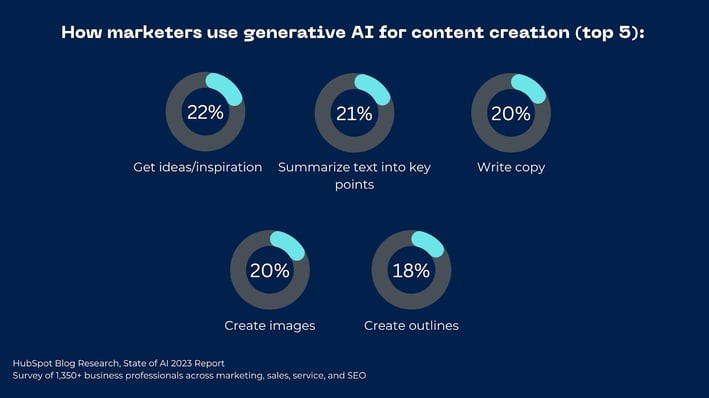
31% of marketers use generative AI to help them make social media posts, while 28% use it for emails, product descriptions (25%), images (22%), and blog posts (19%).
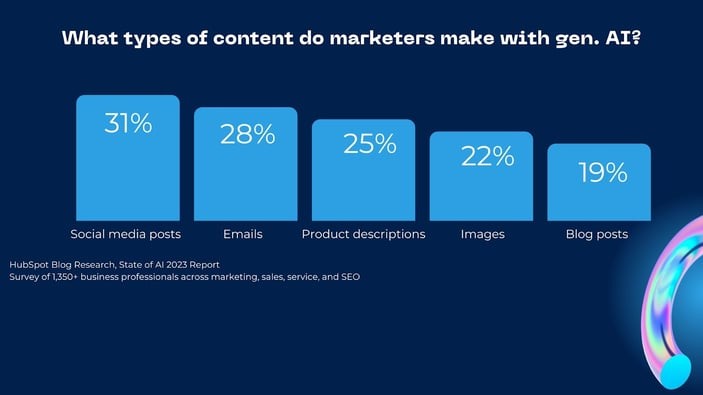
Marketers say generative AI is most helpful for creating social media posts, product descriptions, and responding to emails.
Common Generative AI Tools in Marketing
Chatbots like GhatGPT are the most popular, followed by text generation tools, visual tools, and audio tools.
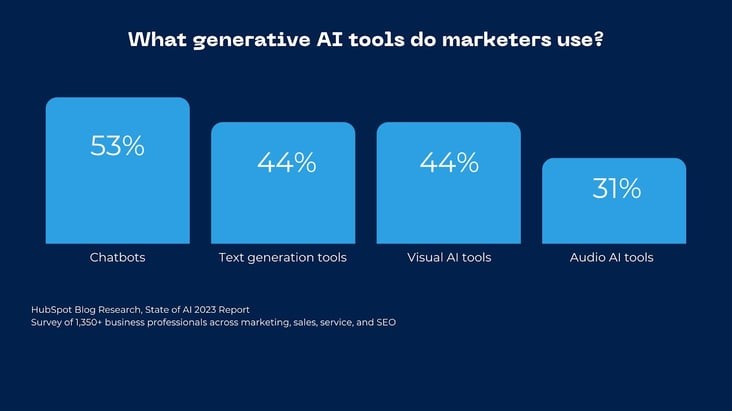
How Bloggers & SEOs Use AI
84% of bloggers and SEOs say AI’s impacted their SEO strategy for 2023.
The biggest benefits of using AI are that it helps bloggers optimize their website for SEO, improves the user experience, helps create an SEO-driven content strategy, and saves time by automating manual tasks.
![The HubSpot Blog’s State of AI Report [New Data]-May-15-2023-03-14-32-8343-PM](https://sitetips.info/wp-content/uploads/2023/05/47cc9b6c1a77088af864bbd58744ab2b-1.jpg)
The three most popular use cases for AI/automation when it comes to websites are analyzing blogs to provide actionable insights (37%), automating time-consuming SEO tasks (35%), and leveraging AI to help create an SEO-driven content strategy (34%).
Bloggers also say these are the most helpful AI use cases for optimizing their website for SEO.

When it comes to chatbots like ChatGPT, 44% of bloggers predict a positive impact on their SEO strategy. 51% see no impact at all, and just 5% see a negative impact.

Prompting Generative AI
If you find yourself prompting AI over and over to get your desired result, that’s totally normal. It's a brand new skill we’re all learning in real time.
For example, 95% of marketers using generative AI to write copy say they prompt it two-to-four times to reach their intended goal — just 4% reach their intended result in a single prompt.
![The HubSpot Blog’s State of AI Report [New Data]-May-15-2023-03-14-33-7621-PM](https://sitetips.info/wp-content/uploads/2023/05/cf6f07c6787fa8f455458c2038ab5b1b.jpg)
The most effective strategies for prompting generative AI are experimenting with different prompts to see what works best, offering relevant context or background info, providing highly specific prompts, and using follow-up prompts to expand on previous ones.
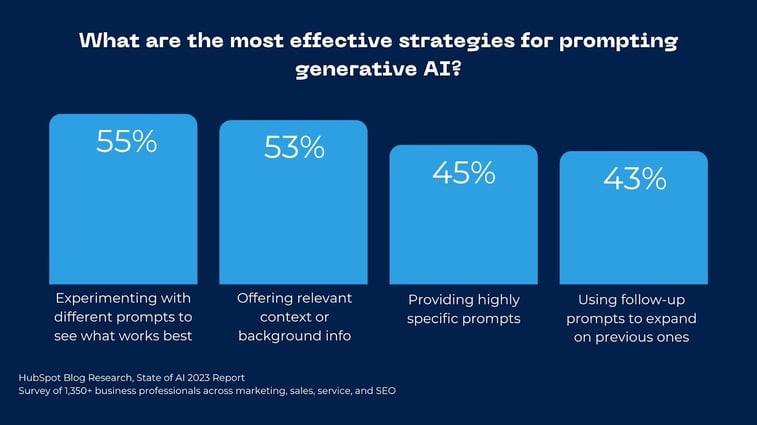
AI Across Business
AI in Sales
Marketing isn’t the only area of business evolving with AI.
71% of sales professionals say AI/automation tools have impacted the way they plan to sell in 2023, and 60% say these tools are important to their overall sales strategy.
The three most popular use cases for AI/automation in sales are automating manual tasks (35%), offering data-driven insights (34%), and helping write sales content or prospect outreach messages (31%). Sales pros also say these AI use cases are the most helpful for reaching their goals.

How Sales Teams Use Generative AI
86% of sales professionals using generative AI to write messages to prospects say it is effective.
The most popular use cases for generative AI among sales pros are content creation, prospect outreach, research, to learn how to do things, and data analysis/reporting.
When it comes to prospect outreach, generative AI is most useful for re-purposing messages to prospects by adapting them to a different audience, writing messages to prospects, and getting ideas/inspiration for prospect outreach messages.
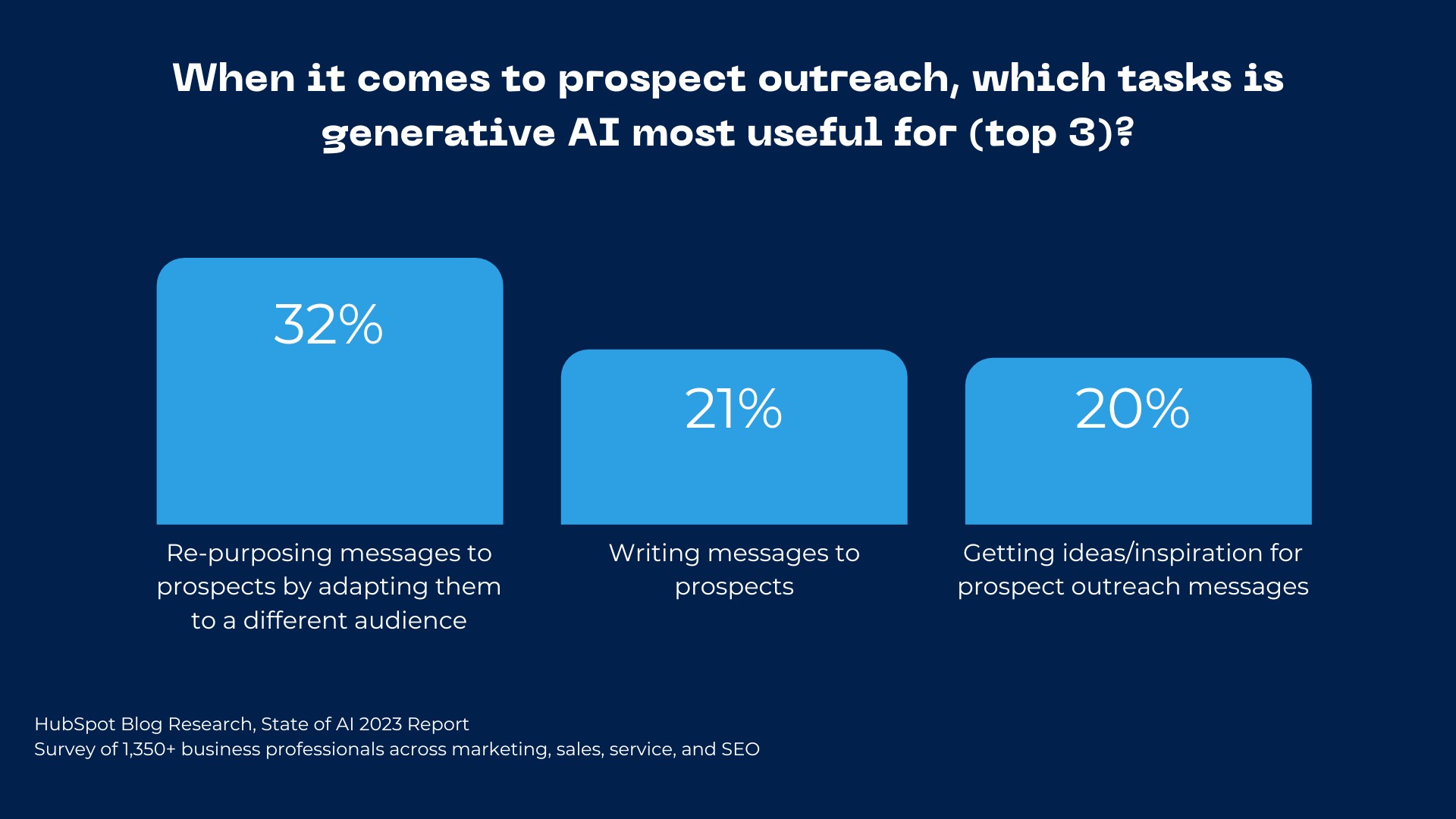
AI in Service
The biggest benefits of using AI/automation tools for customer service are that they make customer service available 24/7, automate manual tasks, and help respond to customer service requests faster, allowing reps to spend time solving more complex tasks.
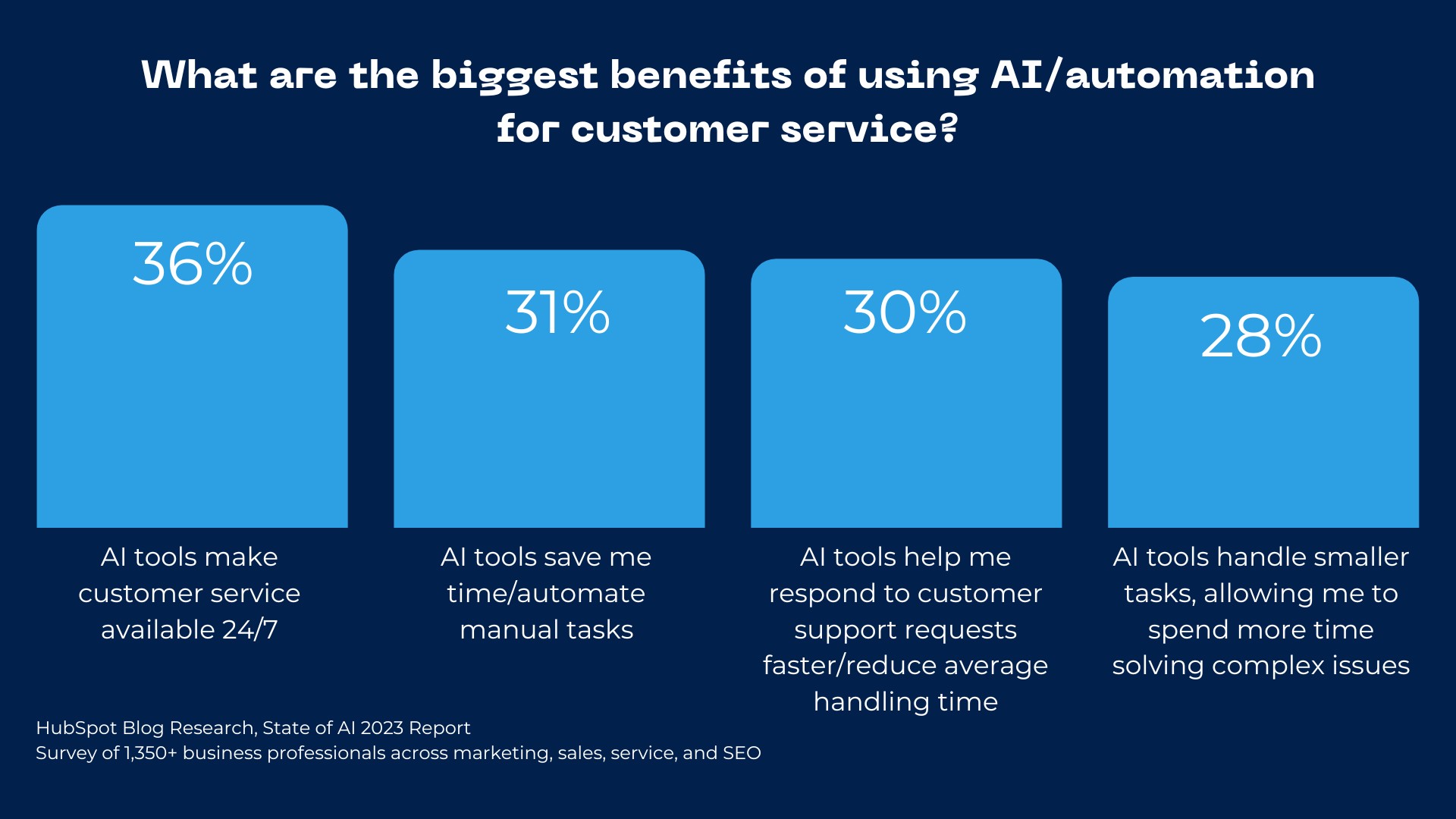
61% of customer service professionals say most reps will use AI/automation in their role by 2024.
The three most popular use cases for service AI/automation are routing requests to reps (29%), collecting and analyzing customer feedback (28%), and enabling chatbots or self-service tools to answer customer questions (26%). These are also the most effective AI use cases in the service field.

Want a deep dive into how AI is changing the overall business-world? Check out this post from The Hustle.
The Future of AI
While we don’t know exactly what will happen next with AI, there’s no doubt that the cat’s out of the bag, and there’s no going back. Here are some predictions from the business professionals in our survey to consider:
- 64% say AI/automation tools will make a significant impact on how they do their job in 2023
- 57% say most software they use will have AI or automation capabilities built in by 2024
- 56% say most people will use a generative AI tool like ChatGPT to assist them in their jobs by 2024
As the landscape changes, we’ll keep tabs on how AI evolves and the ways it’s being used in the workplace. Keep an eye out for more articles with the insights you need to use AI to unleash your human potential, while leaving the busy work to the robots.

